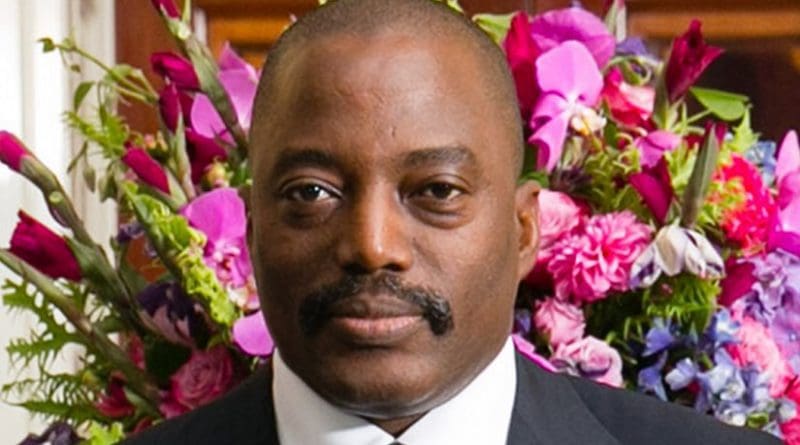Congo’s Elections And The Specter Of Regional Conflict – Analysis
By Tom Wirth*
When Rwanda’s president Paul Kagame declared victory for himself ahead of the vote on August 4, he set the stage for an African electoral season that is unlikely to see any surprises or shake-ups for established leaders. But while the Rwandan elections are generally expected to go over peacefully, conditions in the neighboring Democratic Republic of Congo (DRC) are much more precarious. president Joseph Kabila refused to step down after his two-term limit ended in December 2016, and rising levels of violence, voter intimidation and crackdowns on free speech over the continually postponed elections are plunging the DRC into chaos. The violence is not only exacerbating internal conflicts in the DRC, but threatens to undermine the stability of the Great Lakes region as well.
Since coming to power after his father Laurent Kabila’s assassination in 2000, Joseph Kabila has ruled with an iron fist. When the economy crashed as a result of a fall in copper and cobalt prices (some of the DRC’s most important exports), his response was to tighten the tourniquet around his people. Despite violent protests before and after the general elections in 2006 and 2011, Kabila managed to clinch victory in both. Now he is refusing to relinquish his position after the constitutionally set two-term limited has been reached, citing problems with voter registration and the re-ignition of civil war in the country’s Kasai region. Kabila’s non-committal stance on the issue is only fanning the flames threatening to engulf the entire country.
Kabila is ruling over an increasingly fractured country, but one in which opposition to his reign is very much alive. Unsurprisingly, he is not going down without a fight. Kabila has killed or arrested opposition activists and journalists, while protests against his continued rule have been suppressed by security forces resulting in dozens of deaths. Moise Katumbi, Kabila’s most potent rival in any potential election, is also barred from returning to Congo. Katumbi was forced out to leave the country on trumped up charges of hiring mercenaries, and fearing for his safety, Katumbi recently filed a legal complaint with the UN to receive international protection if he returns to run in a future presidential election. Kabila has ample reason to fear Katumbi’s popularity within the country: the former provincial governor was already the leading presidential contender, even before fellow opposition leader Etienne Tshisekedi passed away in February. His approval rating last year stood at 85.8%, outstripping Kabila’s by forty points.
Could the events unfolding in DRC be a foreboding warning to Kagame, who has held onto his position since coming to power in the wake of the 1994 Hutu-Tutsi genocide? Not in the immediate term, at least. In contrast to Kabila, Kagame is respected by the population as a nation-builder, and is regarded as a guarantor of peace and stability. He earned that reputation by maneuvering the country through a miraculous turn-around, ushering in an unprecedented period of peace and stability since the genocide ravaged Rwandan society. This is why he got away with amending the constitution to stay on as president, even after 23 years in power – a feat Kabila may be seeking to emulate. Of course, seeing how the United States pre-emptively threatened to impose new sanctions if elections are not held, a Kagame-style power play would be a surefire way for the Congolese leader to push himself even further into a corner.
While Kagame is expected to claim victory comfortably once again, this will not happen purely on his merits as a leader alone. His fierce intimidation tactics against his electoral rivals play an important role as well. Although calm since the end of the genocide, Rwanda’s peace is maintained through fierce oppression characterized by media censorship and the disappearance of critical journalists. Though the opposition is less organized and lacks a galvanizing figure such as Katumbi, Kagame is going out of his way to ensure things stay the way they are. In the past, opposition figures turned up as corpses in the run-up to elections. In July, Rwanda’s electoral commission moved to disqualify three candidates for the presidential election, claiming they had failed to fulfill specific requirements such as collecting a sufficient amount of supporting signatures.
Now, with numerous armed groups rising amid the DRC’s bloodshed, the brittle peace in the Great Lakes region may be upended. The March 23 movement that wreaked chaos in Eastern DRC, the brainchild of Rwandan military officials, could find fertile ground to rise again. Officially dissolved in a 2013 peace accord, former guerrillas are accused of killings in Uganda, which has prompted the Ugandan government to demand they return to Congo. The DRC has also pointed fingers at Rwanda over an influx of Rwandan soldiers into DRC territory. It was Kagame who helped lift the Kabila clan to power before being double-crossed by Laurent Kabila, who helped the perpetrators of the genocide Kagame had expelled. Indeed, Rwanda has a track record of exploiting Congo’s resources through conflict, and the situation on the ground is favorable to renewed infiltration.
Fighting is already worsening in the central-western Kasai region of the DRC, but a wider breakdown perpetuated by the political crisis could create a situation almost impossible to contain. Considering the complex dynamics at play, could the spill-over effects eventually break the fragile peace imposed on Rwandan society? In any event, the stakes of the DRC election for the entire region’s security cannot be overstated: an escalating regional conflict would constitute a massive setback for all the progress made in the region.
*Tom Wirth is a graduate in International Affairs from St. Gallen with a focus on conflicts in Africa. His articles have previously been published on global-politics.co.uk, a British online journal offering analysis on a wide range of topics in international affairs.

